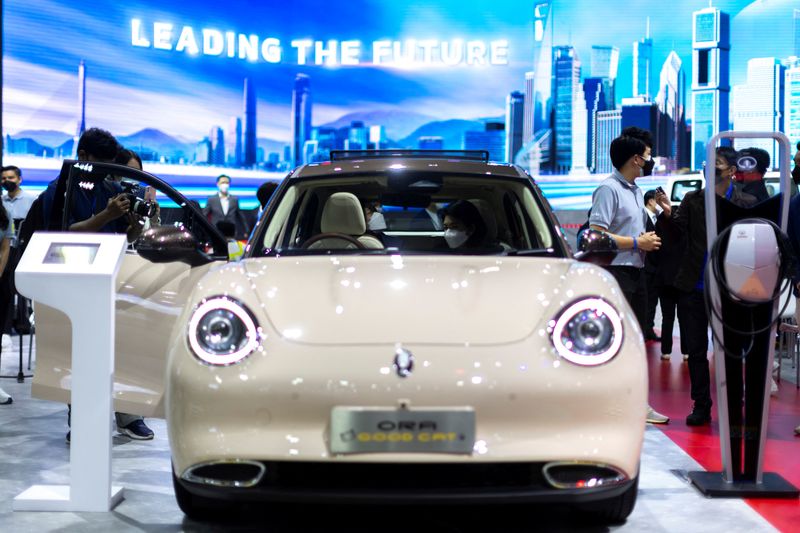
EV car Good Cat by Ora, a brand by Great Wall Motors, is displayed at the Bangkok International Motor show in Bangkok, Thailand, March 22, 2022. REUTERS/Athit Perawongmetha
March 22, 2022
By Chayut Setboonsarng
BANGKOK (Reuters) – Chinese automaker Great Wall Motor has signed an agreement with Thailand’s government to slash retail prices of its electric vehicles, an executive said on Tuesday, a move aimed at boosting domestic EV sales and production.
The agreement, which involves a government subsidy and reduction in value-added tax, could save customers up to 160,000 baht ($4,779) per unit, Michael Chong, General Manager of Great Wall Motor Thailand told Reuters.
That would apply to vehicles typically priced 1 million baht, representing a saving of about 13-15%.
“This is very beneficial for our customer … because this price is more affordable,” he said at the annual Bangkok International Motor Show.
A similar agreement has also been signed with rival automaker, SAIC-CP Motor, the Thai unit of SAIC Motor Corp, the finance ministry said on Monday.
Those come as Thailand tries to incentivise EV use and preserve its status as a major regional automaker. The government is targeting production of 725,000 EV units a year, or 30% of output by 2030.
Chong said other factors like rising energy prices were also driving EV demand.
“Oil prices keep increasing, so people who buy ICE (internal combustible engine) will feel it’s more expensive,” Chong said, adding that EVs would help make air cleaner, something Thailand’s capital has struggled with.
Great Wall Motor in 2020 took over the General Motors plant in Thailand, Asia’s fourth-largest auto assembly and export hub.
Auto manufacturing accounts for about 10% of Thai gross domestic product and manufacturing jobs.
This year the firm plans to sell 20,000 units in Thailand between its two brands, the BEV Ora Good Cat and Haval SUVs, Chong added. It plans to locally produce EVs in 2024.
But the transition will take time, however, with less than 4,000 fully-electric vehicles registered in Thailand last year, and manufacturing investments still being made in conventional engines.
Those include U.S. automaker Ford, which invested $900 million to upgrade its Thai factories to build its Ranger pickup truck and Everest SUV.
“ICE is going to be around for a while,” said Andrea Cavallaro, Ford Operations Director, International Market Group, adding EV technology and infrastructure has yet to be adopted across Southeast Asia.
(Reporting by Chayut Setboonsarng; Editing by Martin Petty)

